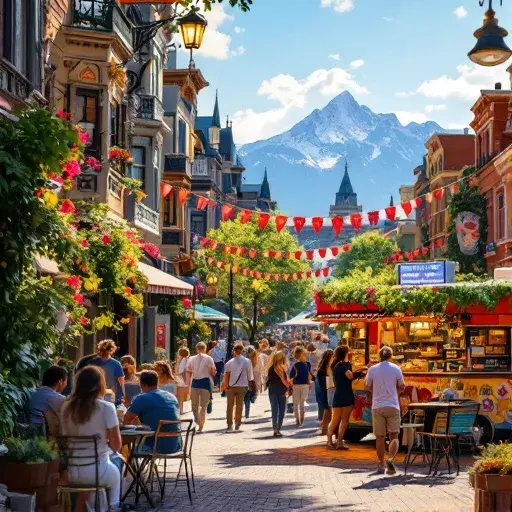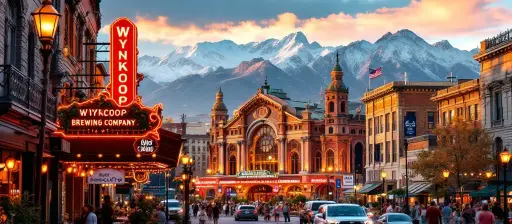Exploring Denver's Culinary Heights: A Food Lover's Guide to the Mile High City

Nestled against the backdrop of the majestic Rocky Mountains, Denver stands as a vibrant metropolis that seamlessly blends urban sophistication with rugged outdoor charm. Known as the Mile High City due to its elevation exactly one mile above sea level, Denver has transformed from a gold rush town into a cultural and culinary powerhouse. With 300 days of sunshine annually, a booming craft beer industry, and an outdoor-oriented lifestyle, Denver offers visitors a unique blend of natural beauty and urban excitement that makes it an ideal destination for food lovers and adventure seekers alike.

Introduction
Nestled against the backdrop of the majestic Rocky Mountains, Denver stands as a vibrant metropolis that seamlessly blends urban sophistication with rugged outdoor charm. Known as the Mile High City due to its elevation exactly one mile above sea level, Denver has transformed from a gold rush town into a cultural and culinary powerhouse. The city's rich history as a frontier outpost has evolved into a dynamic food scene that reflects both its Western heritage and contemporary influences. With 300 days of sunshine annually, a booming craft beer industry, and an outdoor-oriented lifestyle, Denver offers visitors a unique blend of natural beauty and urban excitement.
Denver's food culture has undergone a remarkable renaissance in recent years, establishing the city as one of America's most exciting culinary destinations. From farm-to-table restaurants showcasing Colorado's agricultural bounty to innovative chefs pushing creative boundaries, Denver's dining landscape offers something for every palate and preference.
Overview of the Food Scene
Denver's culinary identity is deeply rooted in its Western heritage, with traditional steakhouses and game meats still holding a prominent place in the local food scene. However, the city has evolved far beyond these classics, embracing global influences and innovative cooking techniques. The farm-to-table movement thrives here, with many restaurants maintaining close relationships with Colorado farmers, ranchers, and food artisans to source the freshest seasonal ingredients.
The city's craft beer scene is legendary, with Denver often called the "Napa Valley of Beer." With more than 100 breweries in the metro area, beer enthusiasts can sample everything from traditional lagers to experimental sours and barrel-aged specialties. This brewing expertise has influenced the food culture as well, with many restaurants offering thoughtful beer pairings and incorporating craft brews into their recipes.
Denver's food halls represent another exciting dimension of the culinary landscape, offering diverse dining options under one roof. These communal spaces showcase local chefs and food entrepreneurs in a casual, accessible format. Meanwhile, the city's cultural diversity is reflected in excellent Mexican, Vietnamese, Ethiopian, and other international restaurants scattered throughout various neighborhoods. From upscale dining establishments to food trucks and farmers' markets, Denver's food scene offers a delicious adventure at every turn.
Where to Eat
Mountain-Inspired Morning Fare
Start your culinary journey with breakfast at Snooze, an A.M. Eatery, a beloved Denver institution known for creative pancake flights and inventive breakfast cocktails. Be prepared for a wait, especially on weekends, but the pineapple upside-down pancakes and breakfast pot pie are worth it. For a quicker but equally delicious option, visit Denver Biscuit Company, where massive, flaky biscuit sandwiches like the Franklin (fried chicken, bacon, cheddar, and sausage gravy) will fuel your day of exploration.
Larimer Square Lunch & Libations
Head to historic Larimer Square, Denver's oldest and most charming block, lined with Victorian buildings housing some of the city's best restaurants. Enjoy lunch at Rioja, where James Beard Award-winning chef Jennifer Jasinski serves Mediterranean-inspired cuisine with a Colorado twist. The artichoke tortelloni and fresh seafood dishes showcase her talent for balancing flavors. Afterward, stroll to Cooper Lounge in the beautifully restored Union Station for craft cocktails with panoramic city views, or dive into Denver's beer culture at Wynkoop Brewing Company, the city's first brewpub co-founded by former Colorado Governor John Hickenlooper.
RiNo's Culinary Creativity
Dinner in the River North Art District (RiNo) offers a glimpse into Denver's most dynamic neighborhood. Start with innovative small plates at Work & Class, where the rotating menu features Latin-American influenced dishes in a lively, communal atmosphere. For a more upscale experience, Acorn inside The Source food hall offers wood-fired cooking and seasonal ingredients in an industrial-chic setting. End your evening at Death & Co, an outpost of the famous New York cocktail bar, where mixologists craft some of the city's most sophisticated drinks.
Highland Neighborhood Highlights
Denver's Highland neighborhood offers some of the city's most exciting dining options. Begin at El Five for Mediterranean tapas and spectacular city views from its penthouse location. The paella and pintxos are standouts, but don't miss the creative cocktails. For a more casual experience, Avanti F&B functions as a collective eatery housing multiple restaurant concepts under one roof, allowing you to sample different cuisines while enjoying rooftop views of downtown. Complete your culinary tour at Little Man Ice Cream, a neighborhood icon housed in a 28-foot-tall cream can, serving handmade ice cream in unique flavors like salted Oreo and honey almond.
What to Do
Outdoor Adventures in the City
Denver's natural beauty is accessible even within city limits. Spend a morning exploring Red Rocks Park and Amphitheatre, just 15 miles west of downtown. This natural amphitheater carved from massive red sandstone formations offers hiking trails with stunning views, especially beautiful when wildflowers bloom in spring and summer. The venue hosts concerts, but visitors can explore the grounds and visitor center during the day for free. Back in the city, the 330-acre City Park offers beautiful mountain views, lakes, and houses both the Denver Zoo and Denver Museum of Nature & Science.
Cultural Immersion
Denver's cultural scene rivals its natural beauty. The Denver Art Museum features an impressive collection of American Indian art and a striking building designed by Daniel Libeskind. A few blocks away, the Clyfford Still Museum houses the most comprehensive collection of the abstract expressionist's work. For a different kind of cultural experience, take a tour of Coors Field, home of the Colorado Rockies baseball team, where even the nosebleed seats offer mountain views. The stadium's location in the historic LoDo (Lower Downtown) neighborhood makes it easy to combine with exploring Denver's oldest area.
Denver Botanic Gardens & Cherry Creek
For a peaceful retreat, visit the Denver Botanic Gardens, a 23-acre oasis featuring stunning seasonal displays and specialized gardens showcasing plants from Colorado and similar climates worldwide. The Japanese Garden and the Conservatory are particularly impressive. Afterward, head to the upscale Cherry Creek Shopping District, where you can browse high-end boutiques and galleries. Even if shopping isn't your priority, the area's tree-lined streets and outdoor cafes make for a pleasant afternoon stroll.
Brewery Tours & Food Halls
No visit to Denver would be complete without exploring its renowned craft beer scene. Take a guided tour of Great Divide Brewing Company to learn about the brewing process while sampling their award-winning beers. For a self-guided experience, follow the Denver Beer Trail, which maps out dozens of breweries across the city. Complement your beer exploration with visits to Denver's innovative food halls like Denver Central Market in RiNo or Milk Market downtown, where you can sample multiple local food vendors under one roof.
Where to Stay
For food-focused travelers, staying in Lower Downtown (LoDo) or River North Art District (RiNo) offers the most convenient access to Denver's culinary highlights. LoDo, with its historic warehouses converted into hotels, restaurants, and shops, puts you within walking distance of Union Station (a food destination itself), Larimer Square, and numerous breweries. The area offers accommodations ranging from luxury hotels like The Crawford inside Union Station to boutique properties and vacation rentals.
The more edgy RiNo district provides a glimpse into Denver's artistic side, with street art adorning buildings throughout the neighborhood. This area houses some of the city's most innovative restaurants, breweries, and distilleries in converted industrial spaces. While accommodation options are more limited than in LoDo, several new hotels and Airbnb options have emerged to meet growing demand. Staying here puts you at the center of Denver's creative energy.
For those seeking a quieter experience with easy access to dining and shopping, the Cherry Creek neighborhood offers upscale accommodations surrounded by galleries, boutiques, and restaurants. Though slightly removed from downtown, the area's peaceful atmosphere and pedestrian-friendly streets make it an attractive alternative, especially for travelers who prefer a more relaxed pace.
Conclusion
Denver's evolution from frontier town to culinary destination reflects the city's innovative spirit and connection to its Rocky Mountain surroundings. The Mile High City offers food lovers an exciting blend of traditional Western fare, farm-to-table freshness, global influences, and craft beer excellence. Beyond its food scene, Denver's abundant sunshine, outdoor recreation opportunities, and cultural attractions create the perfect backdrop for a memorable culinary adventure. Whether you're sampling local brews, dining with mountain views, or exploring vibrant neighborhoods, Denver invites visitors to experience the elevated taste of the American West with a modern, creative twist. As the locals say, the Mile High City offers a dining scene that truly soars.